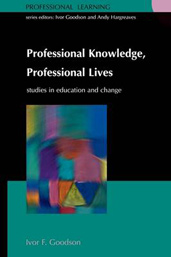Professional Knowledge, Professional Lives: studies in education and change
Educational Research as a Public Intellectual
Reinventing Public Intellectual Work as Education
Broadly speaking, I have been dividing the experience of would-be public intellectuals into two forms. In the period of the 1960s and 1970s those working for social justice undertook intellectual work against the background of a 'world under construction' - thought and action remained allied and the link to policy remained close enough for intellectuals to move beyond mere word games.
In the1980s and early 1990s those intellectuals working for social justice in education faced a 'world under deconstruction' - many of the most dearly held projects were dismantled or came under sustained attack. In this later period detached from action, divorced from policy the public intellectual was forced into an increasingly intellectual position of arguing through words for policies and activities that were subject to what Ball has rightly observed was a 'discourse of decision'. This is a harsh terrain to occupy, yet there are many examples in this room of people who continued to argue for social justice in race, gender and class terms.
I am reminded of a film I recently watched on the American Civil War. As the South was progressively defeated, less and less land was occupied - just a few towns and strips of land. In the end, the commentator said all that was left was a "confederacy of the mind" - a collective memory of an aspiration.
In some ways that has been the fate of movements for social justice and of associated intellectual work in the past two decades. But we should not underestimate the "confederacy of the mind". For one assertion I will make with great force is that the largest problem the attempted reconstruction of the past two decades, the attempt to demolish the Welfare State, have faced is peoples "collective memory" of good public services, of commitments to provision for all, whether it be schools or hospitals. The vital task now is to re-invigorate, re-energise and re-invent new projects and programmes for social justice; for memories and predispositions in Britain remain remarkably resilient. We should now be looking to define a new role for the educational researcher in millennial Britain and do so in ways informed by collective memories of social justice initiatives. This should hopefully presage a new investigation of the role of educational researcher as public intellectual, moving us into a new phase after the hopeful years of the 60’s and early 70’s and the reversal in the two decades that followed. Now we can hope again there are post-modern prospects to explore. I should note that I'm not talking about re-establishing some old master narrative of social justice - more a set of voices and visions, a moving mosaic of intentions and plans.
